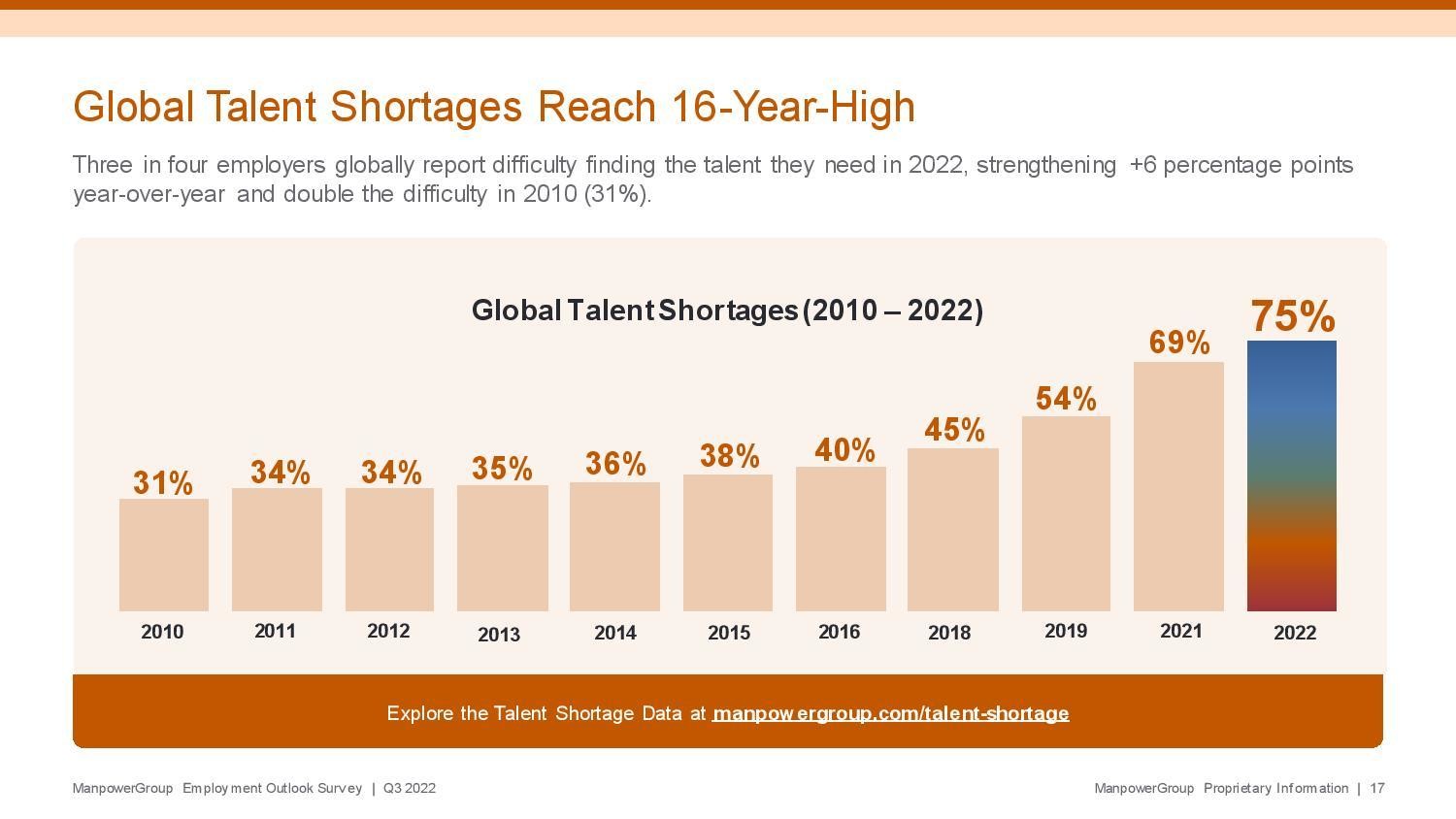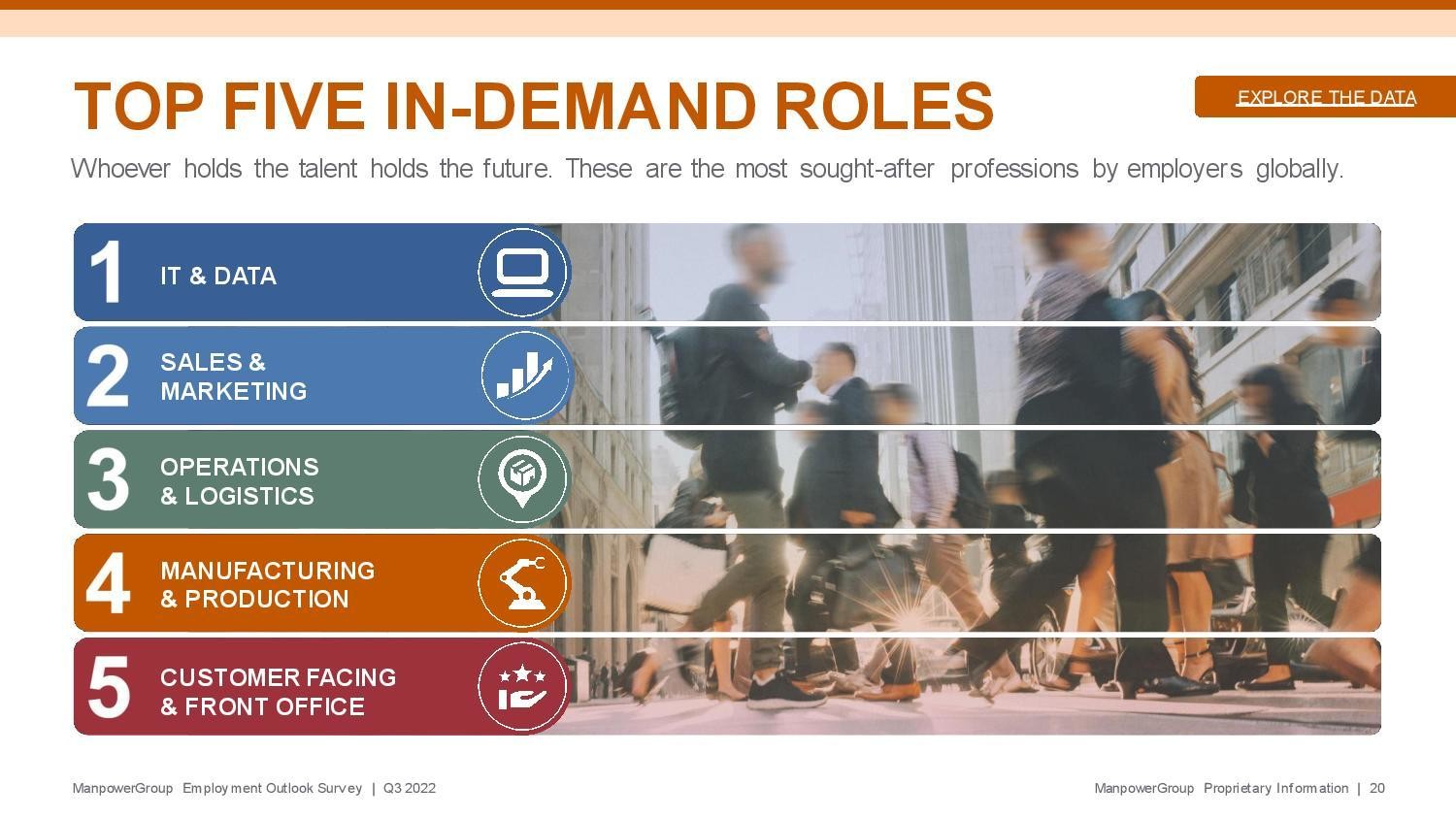These are the world's most in-demand professions

A new ManpowerGroup survey has identified the world's most in-demand jobs and skills.
Image: REUTERS/Brian Snyder
Stay up to date:
Future of Work
Listen to the article
- A new ManpowerGroup survey has identified the world's most in-demand jobs and skills.
- However, it's also identified a global talent shortage that's hit a 16-year-high.
- Three-quarters of employers are struggling to fill open roles, according to the survey.
IT and Data is the most sought-after profession globally, according to a new ManpowerGroup survey.
The Employment Outlook Survey (pdf) surveyed more than 40,000 employers worldwide. It uncovered the most in-demand jobs but at the same time also identified the highest level of global talent shortages in 16 years.
The paradox of in-demand jobs and global talent shortage
"While it’s encouraging to see employers have the intention to hire workers, it’s been increasingly difficult for them to find the talent they need. On top of the skills gap challenge, employers are dealing with wage inflation and competition for workers, as many are switching industries altogether to better suit their lifestyle," said ManpowerGroup Chairman and CEO Jonas Prising.

The most in-demand jobs globally
The ManpowerGroup survey identified the five most sought-after professions globally. In order, they were:
- IT and data
- Sales and marketing
- Operations and logistics
- Manufacturing and production
- Customer-facing and front office

The survey also identified the soft skills that employers are looking for:
- Reliability and self-discipline
- Resilience and adaptability
- Reasoning and problem-solving
- Creativity and originality
- Critical thinking and analysis.
Accept our marketing cookies to access this content.
These cookies are currently disabled in your browser.
A global talent shortage
While the in-demand jobs and skills might be clear, it's also clear that employers are struggling to find people to fill their vacancies.
75% of employers reported difficulty in filling roles, a 6% increase on the same time last year. It's means the global talent shortage has hit it highest level in 16 years.
According to the survey, the most difficult roles to fill are in Education, Health, Social Work, Government, Information Technology, Telecoms, Communications and Media, Banking, Finance, Insurance and Real Estate.
Tackling the skills gap
The World Economic Forum's own 2020 Future of Jobs Report was clear on the work needed to reskill workers. It found that, on average, employers expected to offer reskilling and upskilling to just over 70% of their employees by 2025.
In January 2020, the Forum also launched its Reskilling Revolution platform, which has benefitted more than 100 million people.
As Jonas Prising explained on the release of the survey, "On the ground, we continue to see talent shortages created by the pandemic, the Ukraine conflict starting to impact the supply chain and creating greater uncertainty in the economic outlook. The need for organizations like ours to focus on reskilling and creating talent at scale has never been more important."
Don't miss any update on this topic
Create a free account and access your personalized content collection with our latest publications and analyses.
License and Republishing
World Economic Forum articles may be republished in accordance with the Creative Commons Attribution-NonCommercial-NoDerivatives 4.0 International Public License, and in accordance with our Terms of Use.
The views expressed in this article are those of the author alone and not the World Economic Forum.
Related topics:
Forum Stories newsletter
Bringing you weekly curated insights and analysis on the global issues that matter.
More on Forum InstitutionalSee all
Victoria Masterson, Stephen Hall and Madeleine North
March 25, 2025
Lorez Qehaja
March 19, 2025
Madeleine North
January 28, 2025





